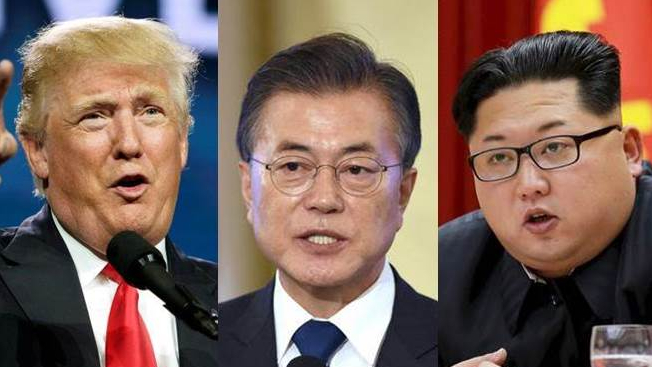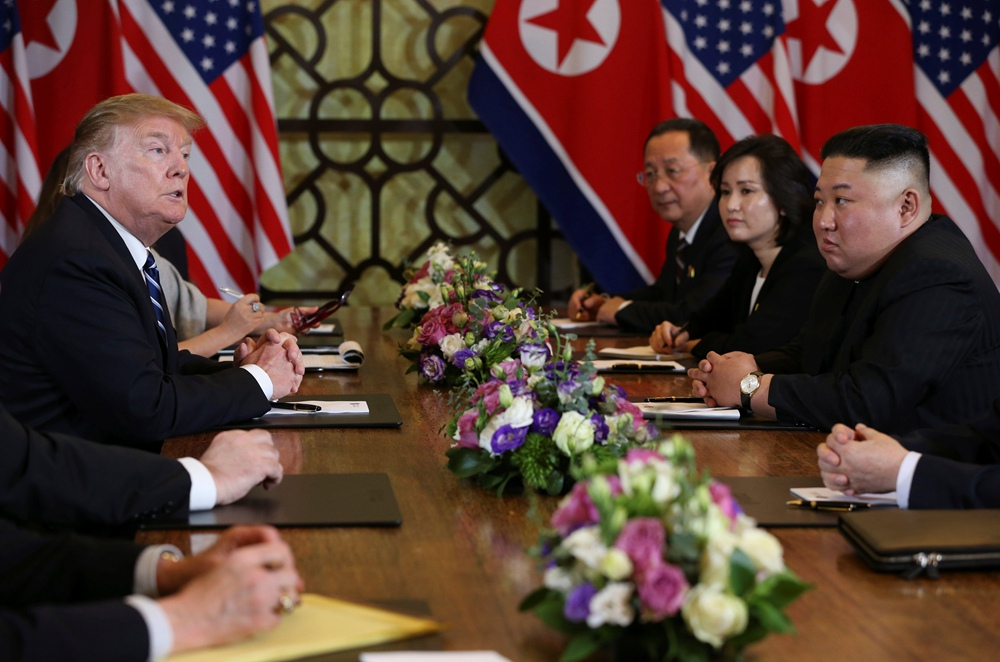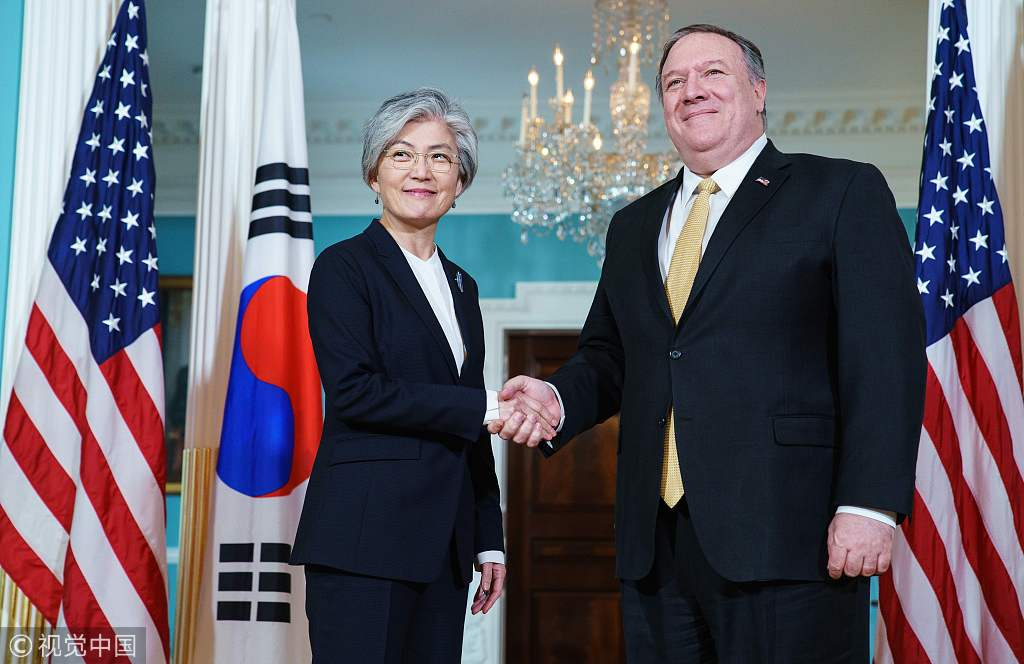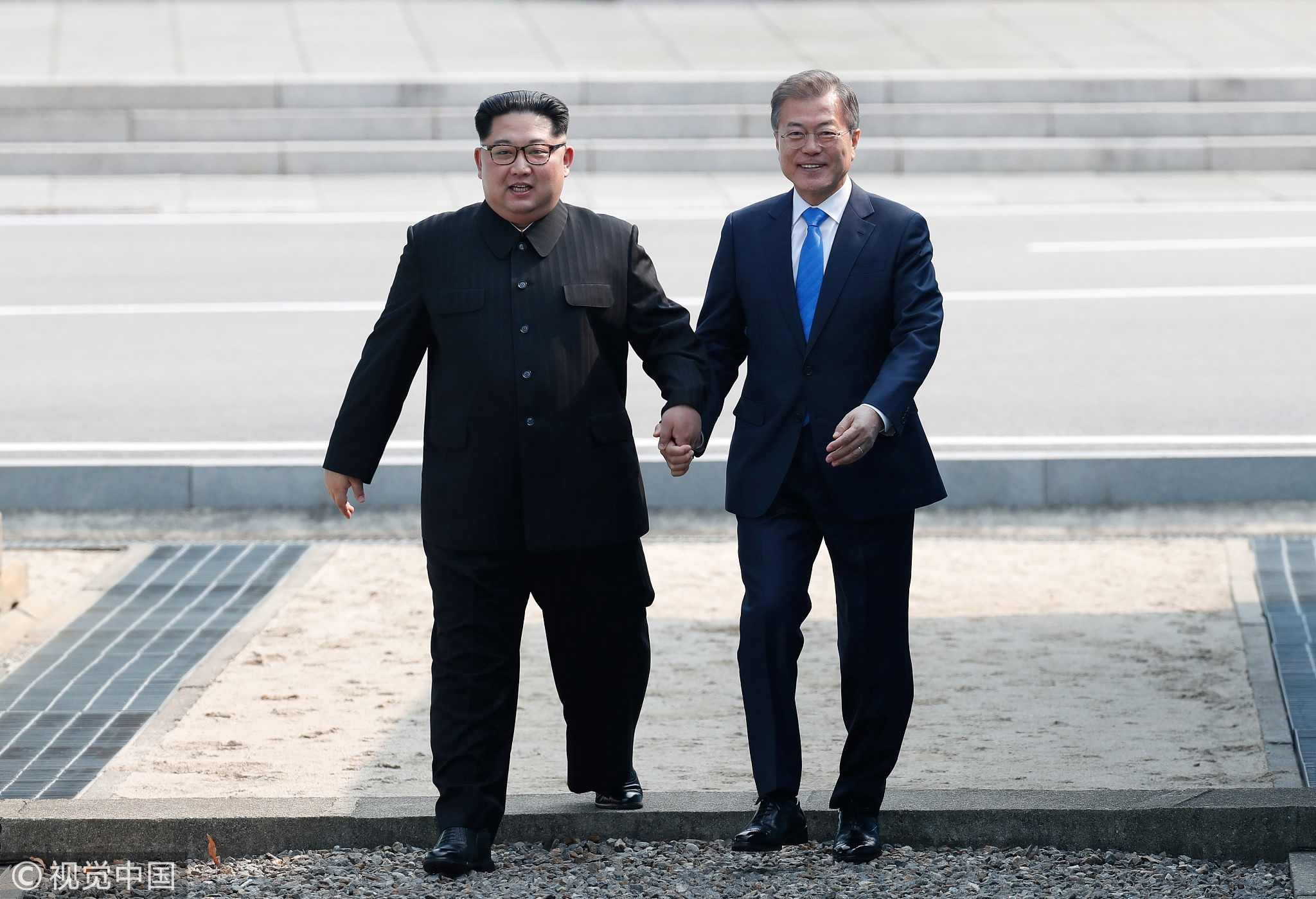
Asia Pacific
15:36, 10-Apr-2019
Can the ROK leader, for the 3rd time, bring Trump and Kim together?
Updated
16:47, 10-Apr-2019
By Li Zhao

President Moon Jae-in of the Republic of Korea (ROK) is set to meet with U.S. President Donald Trump at the White House on Thursday, hoping to pull the breakdown of talks between Washington and Pyongyang back from the brink.
Moon's trip, which will include his seventh meeting with Trump as president, will be the first top-level diplomatic move since the failed February summit between Trump and Kim Jong Un, leader of the Democratic People's Republic of Korea (DPRK), in Hanoi, Vietnam.
The duo walked out before a scheduled luncheon without a deal, divided over the extent of sanctions relief Pyongyang could receive in exchange for steps towards denuclearization.

DPRK leader Kim Jong Un (R) and U.S. President Donald Trump (L) have an extended bilateral meeting during their summit in Hanoi, Vietnam, February 28, 2019. /Reuters Photo
DPRK leader Kim Jong Un (R) and U.S. President Donald Trump (L) have an extended bilateral meeting during their summit in Hanoi, Vietnam, February 28, 2019. /Reuters Photo
Washington called for "fully dismantling of DPRK's nuclear infrastructures" at the summit, leaving Kim blindsided. Just last month, Pyongyang announced that it is considering suspending talks with the "gangster-like" U.S. and rethinking whether to lift its self-imposed ban on missile tests unless Washington makes concessions.
Days later it abruptly pulled personnel from its joint liaison office with Seoul at the border city, before quickly restoring them over the weekend without explanation.
These developments left the ROK mediator, who has led his government's efforts in pushing for a peaceful Korean Peninsula mechanism, worried. With approval ratings plunging at home, Moon needs the dialogues to get back on track.
ROK all in
Sending top officials to the U.S.
The Moon administration has sprung into action in recent weeks, engaging in a series of high-level talks to the U.S.
Foreign Minister Kang Kyung-wha arrived in Washington to meet with U.S. Secretary of State Mike Pompeo in late March.
"The most important thing at this stage, following the DPRK-U.S. summit in Hanoi, is to resume negotiations between (the) DPRK and the U.S.," Kang said.

U.S. Secretary of State Mike Pompeo (R) meets with ROK Foreign Minister Kang Kyung-wha at the State Department in Washington, DC, March 29, 2019. /VCG Photo
U.S. Secretary of State Mike Pompeo (R) meets with ROK Foreign Minister Kang Kyung-wha at the State Department in Washington, DC, March 29, 2019. /VCG Photo
She confirmed that Seoul and Washington are "completely aligned on their end goal" towards Pyongyang.
ROK Defense Minister Jeong Kyeong-doo also discussed the issue with U.S. Acting Secretary of Defense Patrick Shanahan, after Special Representative for Korean Peninsula Peace and Security Affairs Lee Do-hoon held talks about the outcomes of the Hanoi summit with his U.S. counterpart Stephen Biegun.
Keeping top-down contact with the DPRK
“Through the close communication between ROK and DPRK leaders, we will set the direction of developing inter-Korean relations," ROK's Vice Minister of Unification Chun Hae-sung said on March 12.
Seoul is looking for more high-level talks and sectoral working-level meetings with its neighbor, starting with frequent consultations at the liaison office.

DPRK leader Kim Jong Un (L) and ROK President Moon Jae-in cross the Military Demarcation Line. /VCG Photo
DPRK leader Kim Jong Un (L) and ROK President Moon Jae-in cross the Military Demarcation Line. /VCG Photo
Although Pyongyang had withdrawn from the office, it reversed its decision immediately after Trump expressed willingness to ease sanctions chocking the country's economy.
The facility allows officials from the neighboring countries to communicate on a regular basis for the first time since the Korean War – the two sides had talked through special phones lines for decades. The setup of the liaison office was regarded as a major step forward in inter-Korean relations.
'All or nothing' or 'step-by-step'
Although Seoul has reiterated its ultimate goal of "complete denuclearization," the process to achieve it could be at odds with that of Washington.
Denuclearization "can only proceed piece by piece," commented head of the ROK National Intelligence Service Suh Hoon, according to reports by Joongang Daily.
“Complete denuclearization is not something that can be done immediately since it requires a gradual process,” he said.
Seoul's step-by-step approach is closer to Pyongyang's proposal than the U.S.'s "all-in-one" plan. The gradual and corresponding process also aligns with China's stance, which the Asian giant has called "to meet each other halfway."
If Moon wants to keep the talks going, he first needs to persuade Trump to accept an incremental deal.

SITEMAP
Copyright © 2018 CGTN. Beijing ICP prepared NO.16065310-3
Copyright © 2018 CGTN. Beijing ICP prepared NO.16065310-3